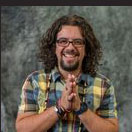vocation of teaching
Select an item by clicking its checkbox
At the time of this conversation, Eric Barreto was on the faculty at Luther Seminary, but he has since joined the faculty at Princeton Theological Seminary. His teaching practice is informed by his bi-regional and multi-lingual backgrounds. The biblical text and the ancient world are sites for destabilizing contemporary notions about the stability of historical conceptions of the possibility/ies of living harmoniously within diverse communities.
The “I” That Teaches - A new video project that invites senior scholars to talk about their teaching lives. These scholar-teachers candidly discuss how religious, educational, and family backgrounds inform their vocational commitments and, also, characterize their teaching persona. From the vantage point of a practiced teaching philosophy we get an intimate account of the value and art of teaching well.
Click here to watch all episodes of "The "I" That Teaches" on YouTube
See Also:
Dr. Joseph Tucker-Edmonds, IUPUI, pulls on the rhetorical practices of the Black Afro-Christian Religious tradition to enliven the classroom experience. He teaches courses on Religion and the Politics of Dissent in the African American Experience, Comparative Liberation Theologies, and Comparative Religions.
The “I” That Teaches - A new video project that invites senior scholars to talk about their teaching lives. These scholar-teachers candidly discuss how religious, educational, and family backgrounds inform their vocational commitments and, also, characterize their teaching persona. From the vantage point of a practiced teaching philosophy we get an intimate account of the value and art of teaching well.
Click here to watch all episodes of "The "I" That Teaches" on YouTube
See Also:
The “I” That Teaches - A new video project that invites senior scholars to talk about their teaching lives. These scholar-teachers candidly discuss how religious, educational, and family backgrounds inform their vocational commitments and, also, characterize their teaching persona. From the vantage point of a practiced teaching philosophy we get an intimate account of the value and art of teaching well.
We begin this series with an interview with Dr. Victor Anderson, Vanderbilt School of Divinity. The title for this project comes from a lecture that Prof. Anderson delivered at Wabash College.
Click here to watch all episodes of "The "I" That Teaches" on YouTube
See Also:

Dear Committee Members: A Novel
Date Reviewed: May 13, 2016
Non-academics who pick up Julie Schumacher’s epistolary novel Dear Committee Members might assume that they are encountering a parody of academic life. Schumacher’s academic readers, however, will wonder whether she sneaked into their own inboxes and printed the choicest items. The novel consists of letters penned by Jason Fitger, a disenchanted and mediocre professor of creative writing and literature in the underfunded English department of Payne University, a less-than-top-tier teaching college. Through his correspondence, Fitger both details and demonstrates most of the mundane (but annoying) challenges and bad behavior of academic life.
Fitger writes letters of reference for students he cannot remember, students he can remember all too well for their lackluster performance, and spectacular students whose career choices are dramatically below (their professor’s assessment of) their capabilities. His frustration at having to write letters is made worse by the combination of technology and bureaucracy that has come to characterize online letters of recommendation – Fitger is out of patience with online form submissions, whose character limits will not let him expound as he sees fit and that log him off or cut him off mid word. He often opts instead to send a letter by mail, certain that the institution will, of course, accept a letter postmarked (rather than electronically submitted) on the due date.
Fitger’s letters chronicle what are now tropes in the writing about academia – for instance, the crumbling but inhabited humanities building, though in Dear Committee Members the insult is compounded because, as Fitger’s exasperated letters detail, not only are the English department’s digs shabby by comparison to the social sciences, but are being made worse through constant construction as the floor above is renovated for the Economics department.
Throughout these letters one gets a sense of the failures of Fitger’s own life. It becomes clear, for instance, that within the administration are both his ex-wife and the (now ex-) lover for whom he left her, and his letters to each intertwine their personal histories with campus politics. Similarly, letters to graduate school friends in the world of creative writing mix advocacy for students with hints of relationships between those successful or not and laments for Fitger’s own squandered promise.
While in no way derivative, Dear Committee Members joins the ranks of academic novels such as Moo, Straight Man, and Wonder Boys. Schumacher, herself a professor of creative writing and literature, knows what she is talking about, and she deploys humor to excellent effect, waltzing the reader through an at best underwhelming professor\'s correspondence, revealing much along the way about the personalities and practices of Fitger and his fellow academics.
It was my first semester teaching. I was anxious and fearful. I was trying to know what to do, while pretending I knew everything. In my second or third class, as I was saying something critical of the US in relationship to 9/11, one student raised his hand and said: “What ...
